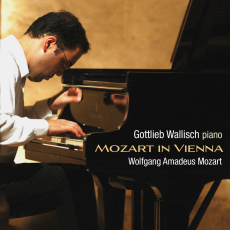Gottlieb Wallisch - Mozart in Vienna - Audiophile Audition
Variety being the spice of life, Gottlieb Wallisch supplies it in a program of very much assorted piano works from Mozart's Vienna years. This includes two of the less frequently heard late sonatas, a standalone fantasy and rondo, and the striking variations Mozart wrote on Gluck's Unser dummer Pöbel meint.
In a day when such recycling was much less frowned on than today, this last piece became, quoted verbatim and orchestrated, the finale of Tchaikovsky's Fourth Suite for Orchestra. If you hear it in its piano incarnation for the first time, you'll probably wonder why Tchaikovsky ever thought it needed his help. The theme itself is a grinning, mock-serious one from Gluck's comic opera The Pilgrim of Mecca. Mozart has fun with this quasi-serious demeanor, injecting repeated grumblings in the bass, pompous counterpoint, and taunting repeated trills. But then there is the near tragic Variation V, which is vintage Mozart no matter what the context. Variation XI is reflective and could be a moment from a comic opera in which a character shares his or her more serious concerns. Then a series of comic rising grace notes announce that the clouds are about to lift for the bounding final variation, with its mock-operatic cadenzas and one last reprise of the serious opening before a leaping, scampering coda.
Getting the subtle tongue-in-cheek tone and the various moods of the work just right-its air of quasi-seriousness, dead seriousness, and outright fun-is something of a balancing act, so I turn here first as an indicator of the kind of program we're in for. I can report that with Viennese-born Gottlieb Wallisch, we're in good hands.
Mozart's last two sonatas aren't heard with any of the regularity of earlier sonatas having an obvious "hook," such as the so-called "Turkish" Sonata (No. 11) or "Easy" Sonata (no. 16), so it's good to have them included, especially in such refined performances as these. Wallisch's runs and ornamentation are impeccable, while his subtle dynamic shadings give these pieces an equally subtle emotional trajectory. These sonatas may lack memorable earmarks such as the ethereal variations of No. 11 or the proto-Romantic yearning of No. 12's first movement. But they are fully mature Mozart, featuring slow movements tinged with a noble melancholy that may be their central attraction. Of the two, No. 17 is the more interesting, with its near-monothematic first movement and simple, jovial last movement, both of which may point to the influence of Haydn.
The Fantasy in D minor, with its subtle range of moods and tempi-from the disquietingly chromatic opening through the sober main theme, at a walking tempo, to the running bridge passages that surround it to the smiling arioso at the conclusion- probably gives us a good idea of Mozart's brilliant improvisations. On the other hand, the prevailingly melancholy Rondo in A Minor of 1787 came at a time when Mozart's public performances were being greatly curtailed and may speak to personal anxieties and a search for inner peace.
So Mozart in Vienna is the story of technical mastery and brilliance, as well as some humor, coexisting with and colored by a growing soberness. Gottlieb Wallisch's technical assurance and understanding of the subtle emotional variances in this music make for a stimulating program very well executed.
Linn's multichannel piano sound is beautifully detailed, the acoustic convincingly rendered.

